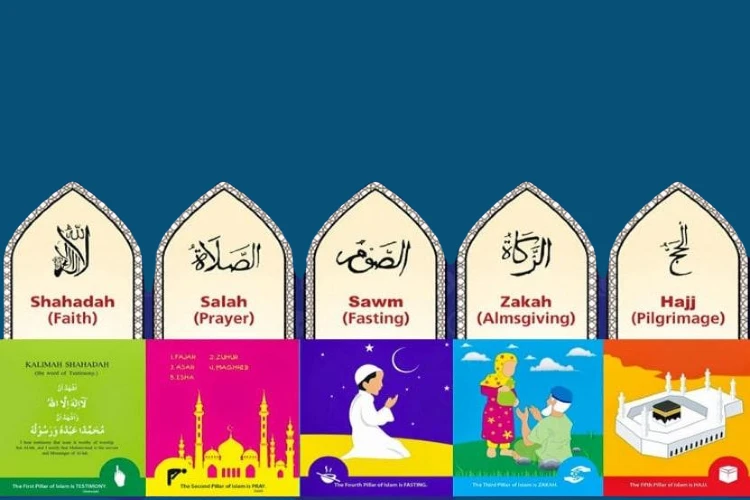
Eman Sakina/New Delhi
In Islam, it is important to recognize and acknowledge one's duties and obligations towards faith. As Ramadan is not too far away, now is as good a time as any to educate ourselves on the five obligations of a Muslim in Islam.
There are five key practices that all Muslims are obligated to fulfill throughout their lifetime. These practices are referred to as pillars because they form the foundation of Muslim life.
They are viewed as compulsory for individuals who genuinely wish to pursue a life like that which Muhammad led, which was a prudent and mindful life. Each of the five pillars works in tandem with one another to bring the essence of Islam as a religion of peace and submission to Allah, into the lifestyle of every Muslim.
The five pillars – the declaration of faith (shahada), prayer (salah), alms-giving (zakat), fasting (sawm), and pilgrimage (hajj) – constitute the basic norms of Islamic practice. They are accepted by Muslims globally irrespective of ethnic, regional, or sectarian differences. Let us discuss them step by step in some detail:
1. Shahadah
Shahadah is the term given to making a declaration of faith and dedication to your belief that there is only one God, Allah and that He sent His Messenger, Prophet Muhammad to guide us. As the First Pillar of Islam, Shahadah is one of the most important and acts as your first submission to Islam and announcing your intention as a true follower. Reverts to Islam are also required to make Shahadah their first act of joining the faith and this serves as an affirmation of their commitment to their faith.
2. Salah
Salah, also written as Salat, is the second Pillar of Islam and the act of obligatory daily prayer that is carried out five times a day at set times. The five prayer times fall between sunrise and midnight, although the times change depending on where you are in the world and the time of year, in line with the lunar calendar. The prayers in order are as follows; - Fajr; dawn, before the sun has fully risen - Zhuhr; midday, once the sun has passed the highest point - Asr; late afternoon, and before the sun begins to set - Maghrib; after sunset, once the sun dips below the horizon - Isha; between sunset and midnight Part of the ritual of Salah is purifying your physical self (ablution) in preparation for prayer, this is a cleaning ritual known as wudhu and is an important first step that also washes away minor sins. Adhan, the call to prayer, is broadcasted from Mosques to announce the set time for Salah throughout the day. Whilst Salah is an act of worship to Allah, it is not, in any way, shape, or form, for anyone’s benefit other than oneself - Salah is an important reminder that there is no one greater than Allah. During Salah, the mind should be free from any otherworldly thoughts.
3. Zakat
Zakat literally means ‘to cleanse’ but is recognized by many as ‘charity’. In Islam, it is believed that Allah has intentionally created different levels of wealth for each individual to test humanity and generosity amongst believers. Every year, Muslims pay a 2.5% share of their held wealth (cash, property, gold, and silver) over a certain threshold to charity to help those less fortunate than themselves. An important lesson of Zakat is the acknowledgment that nothing we gain in this world is ever truly ours, it will not accompany us to the Hereafter, and it has no use to be buried with us. Rather than our wealth, it is our good deeds towards those who need help and support that will help us enter Jannah (Heaven) and this shouldn’t be forgotten. The belongings we have in this world are just that – material items - and these items provide no spiritual guidance. Instead, it is how we use the wealth and materials we have gained to help others that will enhance our journey to the Hereafter and help us to let go and turn away from greed.
4. Sawm
The term Sawm means to fast, which is where the month of Ramadan comes in. Fasting during the holy month of Ramadan is more than simply avoiding food. It is the practice of discipline and the abstaining of temptations and bad habits. From sunrise to sunset, able Muslims should avoid food and drink (including water), sexual activity, smoking and intoxication, and any impure thoughts. Throughout Ramadan and the rest of the year, everyone should abstain from acts of evil and causing harm to oneself or others. One of the key principles of this month is to attain taqwa (closeness to Allah) and to instill fear of Allah. The month itself holds countless rewards for those who seek repentance, practice and give to charity. Certain individuals may be excused from fasting subject to their circumstances - such as those who are ill, expecting a child, are underage, and so on. There are also certain exclusions for those who are traveling during the fasting day, too. Some of these exclusions entail a forfeit by way of donation if the individual cannot make up the fast later.
5. Hajj
The fifth and final pillar of Islam is Hajj, the annual pilgrimage to Mecca. It is a time that Muslims from around the world congregate in Mecca to worship Allah and perform several rituals to strengthen their faith and devotion. Pilgrims must wear plain white clothing and enter a spiritual state of holiness, known as Ihram. Ihram helps promote unity amongst the Ummah in attendance, for no man or woman, rich or poor, resident or traveler, stands above another. Regardless of our age, ethnicity, status, and race, in the eyes of Allah we are all equal.
ALSO READ: Why do women wear hijab?
